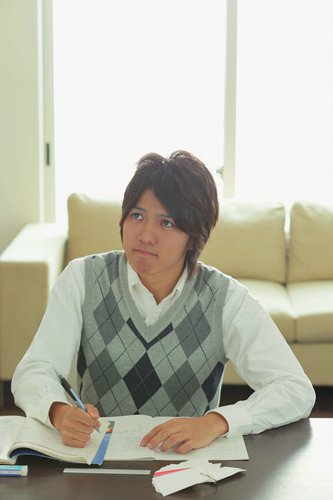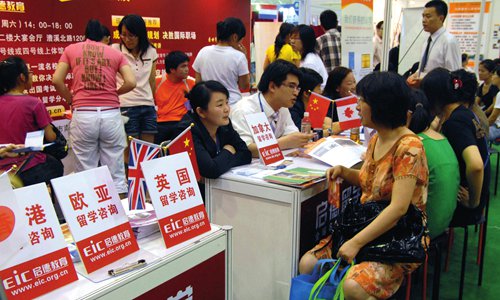
With a growing number of Chinese studying abroad, it has become more difficult to apply to universities overseas. Photo: IC
Long Wanting, a high school senior in China, just sat her Scholastic Aptitude Test (SAT) exam in Hong Kong on December 2.
"When I stepped out of the examination room, I felt the nightmare that haunted me for the past few months had finally come to an end," said Long.
Like many students in China who want to pursue further studies abroad, Long started to prepare several years ago.
"I'm in the international department at my high school, so we started to do practice language exams like TOEFL (Test of English as a Foreign Language) and SAT very early, " said Long.
But preparing to study abroad is never an easy process. "If you just want to get a certificate to attend an ordinary university, you won't be too tired. But if you want to apply to one of the top 30 universities or Ivy League schools, you need to work very hard to get admission," said Long, "as hard as students who take the gaokao (national college entrance examinations) in China."
The gaokao is a one-time test that decides which college you can go to, and, to some extent, determines your path in life. Reluctant to let their entire lives be determined by one test, a lot of Chinese students prefer to study abroad for their bachelor's degree because their future is not decided by only one score but a variety of conditions.
However, with more and more Chinese students choosing to study abroad, the size of this group has started to grow significantly, creating a highly competitive atmosphere.
According to statistics from the Ministry of Education, between 2000 and 2016, there was a rapid growth in the number of Chinese who study abroad. In 2016, around 544,000 Chinese studied overseas, a new high in the number of students who study abroad. According to another report released by New Oriental, an education company in China, Chinese students who read for bachelor's degrees are still the biggest group among all the Chinese students studying abroad.
But despite the growth in numbers, the process is still not easy, and Long may not be the only one who sees it as a new form of the gaokao.
Complicated application process
A lot of documents are required to study abroad, and they vary according to country and even profession.
"For high school students who want to apply to US universities, the basic requirements are high school grades, language proficiency certification, a personal statement and financial proof," said Xing Haodong, a consultant at a study-abroad agency in Beijing.
"The students' high school and language grades decide what level university they can attend. So, their grades are highly related to their final application results."
Long said she was not familiar with the application process, and it was difficult to prepare all the documents on her own, so she looked for a professional agency to help her. But she still needed to work hard to prepare.
"I was up until midnight every day after I started to prepare for TOEFL and SAT. It became a daily routine to stay up late to study for the exams. In the daytime, I usually relied on coffee to stay awake," said Long.
Su Shanshan, who is doing a one-year foundation course in Australia, found that the biggest barrier for her is the language requirement.
"I need to pass the IELTS (International English Language Testing System) test to meet the requirements of my university," said Su. "I think IELTS is a really difficult test because the learning style is quite different from that of my English class, especially the writing and speaking parts."
She said the IELTS test tends to be more academic and practical, so she had to spend a lot of time adapting to the style of the test.
Wang Hao (pseudonym) just started his first year of university in the US. He also did a foundation course. He said he took it because he thought the course would help him adapt to the learning style in US universities.
"Language is the basic requirement for studying in a US university. Compared to local students, we have to work much harder to achieve the same results," said Wang.
He said applying for the course is not difficult, but meeting the requirements of the universities can be really hard.
"We need to spend a lot of time writing essays and studying for tests, just like students in China prepare for the gaokao," said Wang. "The only difference is that we focus on the different aspects. Students who take the gaokao tend to learn a lot of theoretical and academic knowledge, but we focus on more creative and practical things."

Due to the complicated and stressful application process, a lot of Chinese parents who want their children to study abroad turn to agencies for help. Photo:VCG
Bonus points
Apart from the basic requirements, there are also some extra factors that can influence the application results.
"Although grades are a really important factor, a good internship, volunteer work and some related activities will increase their chances of being accepted," said Xing.
Universities abroad tend to look for more well-rounded students, he explained.
Long's high school teacher helped her enter some business competitions and volunteer activities, which were good but time-consuming.
"I spent a lot of time taking part in the business competitions and volunteer activities because US universities prefer students with comprehensive capabilities," said Long. "However, taking part in the extracurricular activities really distracted me from my school work, so I needed to find the balance between them, which was really difficult."
High financial input
The cost of studying abroad is very high, and preparing for study abroad is also quite expensive, which is why it is still a significant burden for some parents.
"The moment we decided to support my son's study abroad, I chose to accept the high financial input," said Wang Yueqin (pseudonym), whose son is studying in a US university.
"Before he went to the US, we spent about 50,000 yuan ($7,556) in study-abroad agency fees and about 40,000 yuan on language courses and exams."
Despite the cost, Wang still thinks it is a worthy investment. She particularly likes the "strict academic requirements for students."
"I think my son can learn a lot under this educational system. What's more, I think studying abroad is a good chance to open up his vision and broaden his horizon, which is beneficial for his comprehensive development," said Wang.
Stressed out parents
Wu Meng (pseudonym), whose daughter and son are both reading for a bachelor's degree in the US, was under a lot of pressure during the application process.
"As a parent, I was not familiar with the application process for US universities, so I sought help from a study-abroad agency. However, sometimes I had doubts about the agency, so I tried to get more information from other sources, which was really tiring and stressful," Wu explained.
She said sometimes she found herself wondering if the application process was worth all the hassle.
"To be honest, I was not sure about whether it was a good idea to send them to study abroad. I think studying abroad is a gamble; I cannot escape from taking risks. The constant confusion and doubt during the process stressed me out," she said.
Another Chinese gaokao?
Many people think that students who choose to study abroad are trying to escape the intense and fiercely competitive Chinese gaokao.
"In the past, studying abroad was not a very difficult process compared to the gaokao. However, nowadays, with the general increase in the standard of living, more families can afford to send their children to study abroad, so the competition has become intense," said Liu Ye (pseudonym), who founded his own study-abroad agency in Beijing.
"In 2012, the entrance requirement for US universities was not that high. With a TOEFL score of 90, students could apply for universities ranked 30 to 40. Nowadays, the same universities require a score of 100 or more to apply. I think the difficulty of studying abroad has increased a lot and is almost the same as the gaokao,"said Liu.
Su said that if she were given another chance, she would still choose to study abroad.
"Although the process is difficult, it improved my ability to deal with a lot of practical and social issues, which I would not have learned from preparing for the gaokao. More importantly, it was always my dream to study abroad, so I don't regret my choice," she said.


